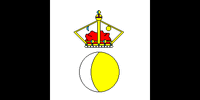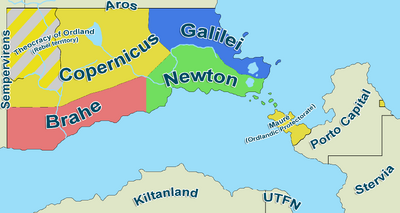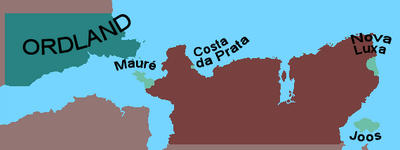| Kingdom of Ordland | |
|---|---|
| Conventional short name: | |
| Local: | Ordland |
| Ingallish: | Ordland |
| Data codes: | OL, ORD |

| |
| Languages: | |
| Official: | Ingallish |
| Others: | Arosian |
| Cities: | |
| Capital: | Newton |
| Other: | Brahe, Galilei |
| Government type: | Constitutional monarchy |
| Population: | 19.372.840 (301 est.) |
| Currency: | Orda |
| Organizations: | Melanian Sea Treaty Organization |
Ordland, officially the Kingdom of Ordland, is a constitutional monarchy located in the continent of Fiarria. Apart from controlling its homeland territory, Ordland is the protector nation of the remnants of the Mauretanian Empire, a set of exclaves across northern Melania now known as the Empire of Mauretania under Ordlandic Protection. The country was once part of the State of Rio, which colappsed on the 18th of July 298. Since its independence, Ordland has been involved in a series of conflicts and coup d'etats which transformed it from a kingdom to a democratic republic, then to a dictatorship, a monarchy once again, a new civilian-military dictatorship and, finally, a third monarchy.
Once an economic and military powerhouse, Ordland has for nearly a decade reduced its participation in international affairs, as it focus its efforts on its ongoing conflict against the Theocracy of Ordland in the northwestern jungles.
History
It is rumored by some scholars that the original homeland of the Westrians is located in what is now western Ordland (or western Rio, hence "West-Rian"), but no archeological records exist to support this theory.
According to modern studies, the first signals of human presence in Ordland date from 13.000 years ago, but modern states would only form circa 3.000BP. These early states were theocracies, ruled by priests of the animist Sun and Moon Cult. The earliest monarch to abandon the cult was Alexander, Grand-Duke of Newton from 680BP to 513 BP, who was responsible for the introduction of Cruisanity. The mythical Grand Duke of Newton, Phillip II of the House of Ord, managed to unite the whole territory in 200BP and named the country after his family's name. Circa 140BP, Angliya and Cruisana established trading colonies in Ordlandic territory. Eventually the Ords themselves established small trading colonies in what is now Kiltanland, displacing the original Kiltan inhabitants.
In 297AP, a coup in Newton established the fascist State of Rio. In 298, after a short war against Armatirion, Rio colapsed under the pressure from several resistance movements. On the 17th of July, Kiltanland declared its independence, followed by Ordland proper the next day.
- Coups and coups and coups.
- Mauretanian War, Kukurian blockade
- Theocracy, internal conflict
Government
Ordland is a constitutional monarchy under King Phillip of the House of Ord. His official title is "His Majesty Phillip, King of Ordland, Master of the Day and Night, Grand-Duke of Newton, Overlord and Protector of Mauretania". The titles "Master of Day and Night" and "Grand Duke of Newton" have belonged to the House of Ord for over seven centuries, while the title "Overlord and Protector of Mauretania" has been bestowed upon him by His Imperial Majesty, the Emperor of Mauretania, upon the formation of the Ordlandic Protectorate.
There is a single-house Chamber of Deputies, with 260 seats elected by universal suffrage of all those above 18 years of age. The parliament elects the prime-minister. The judicial branch is under responsability of a Supreme Court, with seven members appointed by the prime-minister. Local judges are directly-elected.
Major parties in Ordland include the United People's Front, United Labour Party (left-wing), the Reform Party (right-wing), Red Party (communist), the Agrarian Centre Party (centrist) and the Royalist Party (monarchist).
Ordland exerts a protectorate over the remainder of the Empire of Mauretania, known as the Empire of Mauretania under Ordlandic Protection: the territories of Nova Luxa, Joos, Mauré and Costa da Prata. Even though, de jure, the Empire of Mauretania continues to exist as an independent nation, with Ordland only administering the old Empire's foreign and military affairs, the situation de facto is much different. Mauré (combined to the Costa da Prata territory) and Joos are administred as overseas provinces of Ordland, while Nova Luxa is essentially ruled as a constitutional monarchy under the House of Sergio, formely vassals to the Emperor of Mauretania.
Although fully recognizing the independence of Stervia, Porto Capital and San Patricio, Ordland considers the three countries to be lying in the "Area under the Protection of HM" - an arrangement similar to the Realmsprotectorates of the Greater Burovian Realm.
Geography

Map of Orland and its surrounding countries, showing the four regions (Newton, Brahe, Galilei and Copernicus), the Mauré and Costa da Prata components of the Ordlandic Protectorate and the rebel-held lands of the Theocracy of Ordland.

Ordland, the associated territories of the Mauretanian Empire under Ordlandic protection, and the rest of former Mauretania.
Ordland is located in southeastern Fiarria, bordering Aros and Sempervirens. The country is divided in four states or regions, named after their capitals: Newton, Brahe, Galilei and Copernicus. The country also controls a number of islands on the Melanian Sea and on the Mauré Strait.
Due to its position, Ordland is capable of controlling every ship that passes through the Mauré Strait.
The capital city of Ordland is Newton, also capital or the Newton Region. The population of the city is of over 2.300.000 (301 estimative).
Demographics
Ordland has a population of nearly 20 million (301 est.). Despite an important Arosian-speaking minority, most of the population are speakers of Ingallish, due to government campaigns promoting that language in particular. There are also smaller communities of speakers of Mauretanian, Phenixien and Sanpatrician.
Roughly 37% of the population are Cruisans, with 28% being followers of the Papaist Church and the remaining adhering to various other denominations. The historical St. Alexander of Newton is considered the patron saint of Ordland. Roughly 22% are Emethitists, 5% follow the Sun and Moon Cult and 5% are Mounists. Around 30% follow other religions or no religion at all. There is no official state religion.
Military
The Kingdom of Ordland is defended from external threats by the Royal Armed Forces, composed of the Ordlandic Army, Navy, Air Force, Space Force, Border Guard and Coast Guard. All of these are under the command of the Ministry of Defense. All branches are supplied with modern equipment, nearly all of it produced by Ordlandic manufacturers. In the event of a civil crisis, they may be utilized to restore order and distribute humanitarian aid. Meanwhile, the Police and the Royal Guard are under the direction of the Ministry of Internal Affairs.
The Mauretanian Expeditionary Force, made of remnants of the rump Imperial Mauretanian Army, is an independent branch of the Ordlandic military under command of the monarch. It is headed by Ordlandic officers and volunteer men and women from Joos, Nova Luxa, Mauré and Costa da Prata.
The Ordlandic Army was an active player on the series of coups that happened in Ordland from 297 to 301.
Ordland's military was also a key contributor to the Brolecia-Ordland Joint Space Programme. Once a nuclear power, Ordland dismantled its atomic weapons when the country signed the weapons-limiting Valarium Pact in September 299.
Economy
Ordland has a modern and diverse economy. A moderate amount of government planning helps to stabilize the internal market. The country is a major power in both heavy industry and manufacturing, with a good part of the production being destined for export. Agriculture also plays an important part, while tourism is being promoted. Key industry, such as mining and refineries, once held by the state, was privatized over the years 300-305.
Important Ordlandic companies include Ordair, OrdCar, Café de Ordlandia and United Weaponry.
The present political situation in the country, however, has for a long time impacted the economy. As early as 301, it was estimated that as much as 10,7% of the labour force was unemployed.
Ordland has a simple tax structure that is beneficial to the lower and middle classes. The first 30.000 Ordas of any income is tax-free. Over that limit, income is taxed at a flat 19% rate. Businesses and corporations have similar plans. There is a 5% sale tax on all non-food and non-clothing itens; and taxes on luxury items, inheritances and fuels. The government also collects revenue from user fees, duties, and a national lottery.
Ordland's GDP per capita is of circa ChC$20.490 (310 estimative). The currency of Ordland is the Orda - one Orda being worth 0,776 Cruisana Crowns. Orda coins and bills are produced by the Royal Mint, an agency also in charge of functions normally assigned to a Central Bank, such as the setting of interest rates,
Symbols

Grand coat of arms of Ordland.

The Sun and Moon Shield.
The grand coat of arms of Ordland contains elements that reference to the old Grand Duchy of Newton (the silver cross) and Ordland's role as protector of Mauretania (the rising sun and landscape). Over the circular shield, stand the Royal Crown of Ordland, the Grand-Duchal Crown of Newton and the Imperial Crown of Mauretania. Below the shield is the national motto, "Order Makes Peace".
The minor coat of arms, also known as the "Sun and Moon Shield", is the device displayed on the national flag and the one to be used by private individuals in showing allegiance to Ordland.
Ordland's national flag is composed by a white square surrounded on the left and right by black. Each part of black has the same area as half of the white square, thus the two parts of black have a combined area that is equal to the white area. In the middle of the white area, the minor coat of arms. The equal areas of white and black refer to the ancient title of the House of Ord, "Master of Day and Night".
See also: Symbols of Ordland.